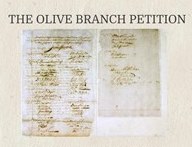The Declaration BEFORE the DeclarationThe Olive Branch PetitionJuly 9, 2018 On July 5, 1775, the Continental Congress sent a letter to King George III, giving him an opportunity to peacefully resolve the growing tensions between England and the Colonies. The King refused to even receive the letter. As a result, one year minus one day later, on July 4, 1776 he was sent a much tougher letter, entitled The Declaration of Independence. On July 5, 1775, the Continental Congress sent a letter to King George III, giving him an opportunity to peacefully resolve the growing tensions between England and the Colonies. The King refused to even receive the letter. As a result, one year minus one day later, on July 4, 1776 he was sent a much tougher letter, entitled The Declaration of Independence.The first letter was called The Olive Branch Petition. It was written by John Dickinson and adopted by Congress on July 5, 1775. It was polite and tactful. Instead of accusing the King of abusing his authority, Dickenson wrote the petition based on the assumption that the government was acting against the Colonies without the King’s knowledge or permission. He knew that wasn’t the case, but he also knew that it’s better to give an adversary a way to save face instead of mounting a frontal assault. “Your Majesty’s Ministers, persevering in their measures, and proceeding to open hostilities for enforcing them, have compelled us to arm in our own defense, and have engaged us in a controversy so peculiarly abhorrent to the affections of your still faithful Colonists, that when we consider whom we must oppose in this contest, and if it continues, what may be the consequences, our own particular misfortunes are accounted by us only as parts of our distress.” By using such language Congress hoped to inform George III that they were displeased with the actions of the King’s ministers – not with the King himself. They ended the missive on a conciliatory note. “That your Majesty may enjoy long and prosperous reign, and that your descendants may govern your Dominions with honour to themselves and happiness to their subjects, is our sincere prayer.” By ignoring the first declaration, the King made the second inevitable. It wasn’t nearly as polite. In fact, it wasn’t polite at all. Thomas Jefferson, the principal author of the Declaration of Independence, was not known for his tact. “The history of the present King of Great Britain is a history of repeated injuries and usurpations, all having in direct object the establishment of an absolute Tyranny over these States.” The Preamble included a universal truth: “We hold these truths to be self-evident; that all men are created equal; that they are endowed by their Creator with certain inalienable rights; that among these are life, liberty and the pursuit of happiness; that to secure these rights, governments are instituted among men, deriving their just powers from the consent of the governed.” The Declaration went on to list the grievances of the Colonies regarding the tyrannical actions of the King. It ended on a powerful note: “We, therefore, the representatives of the United States of America, in General Congress, assembled, appealing to the Supreme Judge of the world for the rectitude of our intentions, do, in the name, and by the authority of the good people of these colonies, solemnly publish and declare, that these united colonies are, and of right ought to be free and independent states; that they are absolved from all allegiance to the British Crown, and that all political connection between them and the state of Great Britain, is and ought to be totally dissolved; and that as free and independent states, they have full power to levy war, conclude peace, contract alliances, establish commerce, and to do all other acts and things which independent states may of right do. And for the support of this declaration, with a firm reliance on the protection of Divine Providence, we mutually pledge to each other our lives, our fortunes, and our sacred honor."
| ||||
 Dr. Tom Barrett is a pastor, teacher, author, conference keynote speaker, professor, certified executive coach, and marketplace minister. His teaching and coaching have blessed both church and business leaders. He has been ordained for over 40 years, and has pastored in seven churches over that time. Today he “pastors pastors” as he oversees ordained and licensed ministers in Florida for his ministerial fellowship. Dr. Tom Barrett is a pastor, teacher, author, conference keynote speaker, professor, certified executive coach, and marketplace minister. His teaching and coaching have blessed both church and business leaders. He has been ordained for over 40 years, and has pastored in seven churches over that time. Today he “pastors pastors” as he oversees ordained and licensed ministers in Florida for his ministerial fellowship.He has written thousands of articles that have been republished in national newspapers and on hundreds of websites, and is a frequent guest on radio and television shows. His weekly Conservative Truth article (which is read by 250,000) offers a unique viewpoint on social, moral and political issues from a Biblical worldview. This has resulted in invitations to speak internationally at churches, conferences, Money Shows, universities, and on TV (including the 700 Club). “Dr. Tom,” as his readers and followers affectionately refer to him, has a passion for teaching, as you can see from his ministry website (www.ChristianFinancialConcepts.com); his patriotic site (www.ConservativeTruth.org); and his business site (www.GoldenArtTreasures.com). Tom's friend Dr. Lance Wallnau wrote of him, "Tom Barrett is a Renaissance man with a passion for subject matter ranging from finance to theology and American history." Visit Dr. Tom Barrett's website at www.DrTom.TV
|
